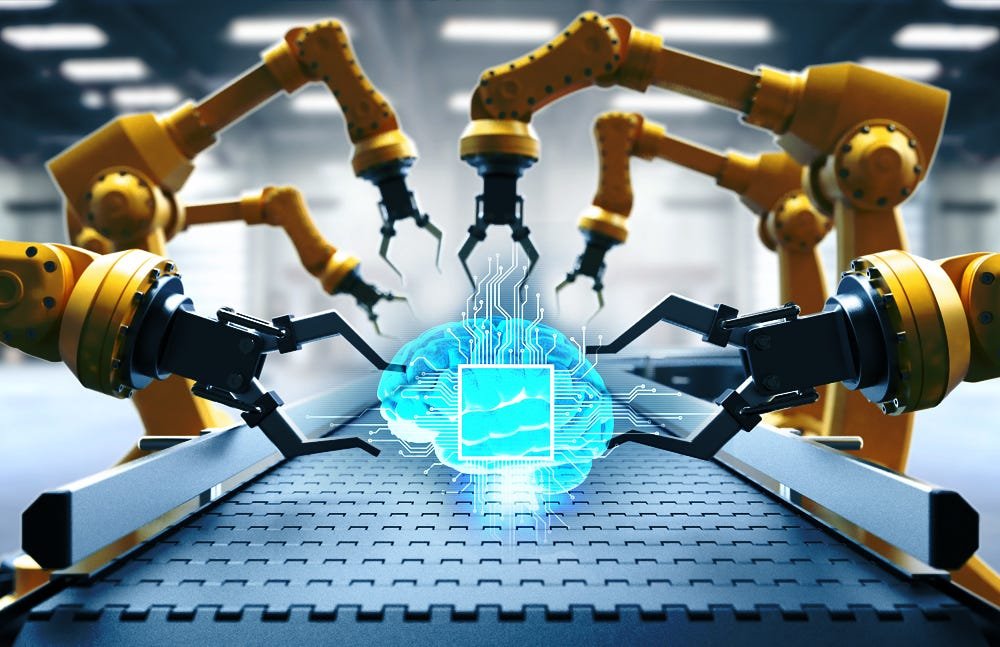The artificial intelligence (AI) in manufacturing market is experiencing rapid growth as industries increasingly adopt AI-driven solutions to enhance productivity, efficiency, and automation. AI is revolutionizing manufacturing by enabling predictive maintenance, process optimization, quality control, and robotics automation. With the rise of Industry 4.0, manufacturers are leveraging AI-powered analytics, machine learning, and computer vision to improve decision-making and reduce operational costs. AI-driven smart factories are minimizing downtime and enhancing production efficiency. The integration of IoT, big data, and cloud computing is further fueling AI adoption in manufacturing. As businesses focus on digital transformation, AI is becoming a critical component in modern industrial operations.
Global artificial intelligence (AI) in manufacturing market size and share is currently valued at USD 3.90 billion in 2023 and is anticipated to generate an estimated revenue of USD 88.35 billion by 2032, according to the latest study by Polaris Market Research. Besides, the report notes that the market exhibits a robust 41.50% Compound Annual Growth Rate (CAGR) over the forecasted timeframe, 2024 – 2032
Key Market Drivers:
- Increasing Demand for Automation & Robotics: AI-powered robots and automation systems are enhancing precision, efficiency, and scalability in manufacturing processes.
- Rise of Predictive Maintenance & Quality Control: AI-driven analytics help detect faults and optimize maintenance schedules, reducing downtime and operational costs.
- Integration of IoT & Smart Manufacturing: AI combined with IoT enables real-time monitoring, data-driven decision-making, and improved production management.
- Growing Adoption of AI-Powered Supply Chain Management: AI enhances demand forecasting, inventory management, and logistics optimization, leading to streamlined operations.
Future Outlook:
The artificial intelligence in manufacturing market is set for substantial expansion as companies continue to invest in smart technologies. The growing adoption of AI-powered digital twins, advanced robotics, and generative AI in production planning will further accelerate market growth. The shift toward autonomous manufacturing systems and AI-driven human-machine collaboration will redefine industrial workflows. Additionally, sustainability initiatives and green manufacturing practices will benefit from AI-based energy optimization and waste reduction. However, challenges such as high implementation costs and data security concerns may impact adoption rates. Nonetheless, advancements in AI algorithms and increasing investments in Industry 4.0 will continue to drive innovation in manufacturing.
Browse Full Report:
Key Companies in Artificial Intelligence in Manufacturing Market:
- ABB Ltd
- Alphabet Inc. (Google)
- Cognex Corporation
- Fanuc Corporation
- General Electric Company (GE)
- Honeywell International Inc.
- Intel Corporation
- International Business Machines Corporation (IBM)
- Microsoft Corporation
- NVIDIA Corporation
- Oracle Corporation
- Robert Bosch GmbH
- Rockwell Automation, Inc.
- SAP SE
- Siemens AG
Artificial Intelligence in Manufacturing Market Segmentation:
Polaris Market Research has segmented the artificial intelligence in manufacturing market based on offering, technology, application, and end-use industry. The offering segment includes hardware, software, and services, while technology segmentation covers machine learning, computer vision, NLP, and context awareness. Application areas include predictive maintenance, process optimization, quality control, and robotics. The end-use industry segment comprises automotive, electronics, pharmaceuticals, aerospace, and heavy machinery.
Artificial Intelligence in Manufacturing, Offering Outlook (Revenue – USD Billion, 2019 – 2032)
- Hardware
- Software
- Services
Artificial Intelligence in Manufacturing, Technology Outlook (Revenue – USD Billion, 2019 – 2032)
- Natural Language Processing
- Machine Learning
- Context Awareness
- Computer Vision
Artificial Intelligence in Manufacturing, Application Outlook (Revenue – USD Billion, 2019 – 2032)
- Production Planning
- Process Control
- Quality Control
- Logistics and Inventory Management
- Predictive Maintenance and Machinery Inspection
- Others
Artificial Intelligence in Manufacturing, End Use Industry Outlook (Revenue – USD Billion, 2019 – 2032)
- Healthcare and Pharmaceutical
- Food and Beverages
- Automotive
- Electrical and Electronics
- Energy and Power
- Heavy Metal and Machine Manufacturing
- Others
Artificial Intelligence in Manufacturing Industry Developments:
The AI in manufacturing sector has witnessed significant advancements, including the integration of generative AI for automated design and process optimization. Leading companies are investing in AI-driven robotics to enhance operational efficiency. The adoption of edge AI for real-time processing on factory floors is gaining momentum. Governments and enterprises are collaborating to develop AI-powered smart factories. AI-powered defect detection systems using computer vision are improving product quality and reducing waste. Additionally, advancements in AI-based cybersecurity solutions are addressing data protection concerns in manufacturing environments.
AI is revolutionizing the manufacturing industry by enhancing automation, efficiency, and decision-making. With continuous technological advancements and increasing investments in smart manufacturing, AI will play a crucial role in shaping the future of industrial production.
More Trending Latest Reports By Polaris Market Research:

